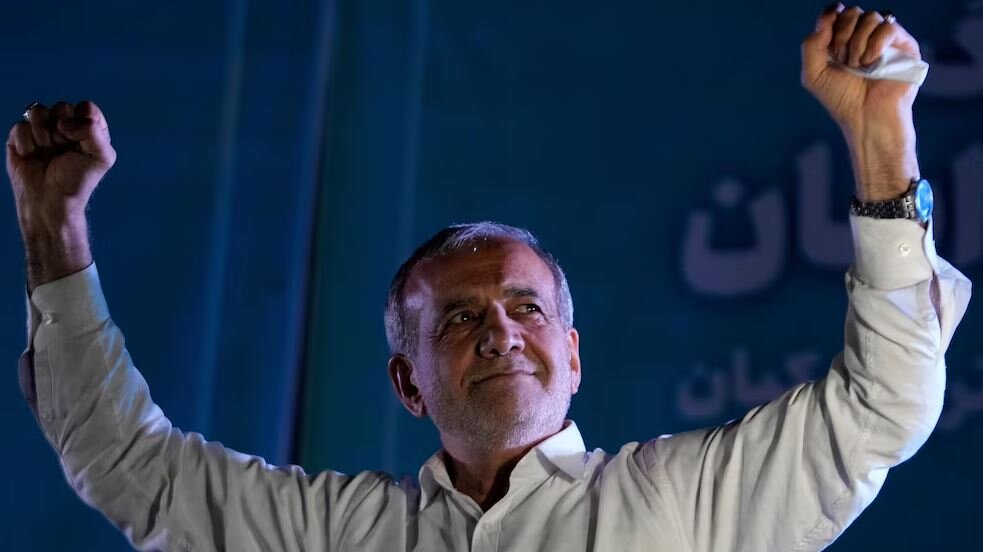Who is Masoud Pezeshkian?

TEHRAN - Iran's Interior Ministry declared Masoud Pezeshkian the winner of the runoff presidential election on Saturday.
Pezeshkian secured a decisive victory, garnering 53.7% of the vote in the second round of the snap election. He outpaced conservative candidate Saeed Jalili, who garnered over 13.5 million votes, by a substantial margin of over 3 million votes.
While Pezeshkian has personally stated that he does not align himself with any political party and therefore does not consider himself a reformist, all prominent figures and politicians who supported him during his campaign were predominantly from the reformist camp. Additionally, his expressed views often mirror those of previous reformist leaders.
Pezeshkian, who also secured the highest number of votes during the first round of the presidential race, emerged victorious despite being the only reformist-affiliated candidate approved by the Guardian Council to compete in the election. His supporters erupted in celebration across the streets around midnight, as he managed to establish a lead over Jalili since the very beginning of vote counting.
In this article, we will be taking a look at the 69-year-old’s life and rise to power.
Early life and education
Masoud Pezeshkian was born on September 29, 1954, in the northeastern city of Mahabad, West Azerbaijan Province. He received his early education in his hometown before moving to the province's largest city, Urmia, to attend an agricultural high school and earn a diploma.
In 1973, during his active military duty, Pezeshkian was assigned to Zabol in Sistan and Baluchestan province. His time in Zabol was marked by his commitment to community service: he established a mosque, participated in cultural activities, and fostered connections with the local community. Despite facing reprimands for disobeying orders from the Shah's army, Pezeshkian remained steadfast in his mission to spread the teachings of Islam.
The transformative experiences of his military service led Pezeshkian to pursue a career in medicine. Following the completion of his military duty, he obtained a science diploma in 1976 and gained admission to a medical program in Tabriz that same year.
During the Iran-Iraq war, Pezeshkian served as the leader of medical teams deployed to conflict zones. He bravely played a dual role as a combatant and a doctor, providing critical medical care to wounded soldiers stationed behind the front lines. His dedication and service during this challenging period shaped his future path and solidified his commitment to humanitarian work.
Career and entrance into politics
After completing his medical studies in 1985, Dr. Masoud Pezeshkian initially delved into teaching physiology to university students. In 1990, Dr. Pezeshkian earned his specialization in general surgery from Tabriz University, marking the beginning of his journey toward becoming a renowned heart surgeon. Following this achievement, he pursued his subspecialty training in heart surgery at Iran University of Medical Sciences, successfully obtaining his degree in 1993.
Pezeshkian then dedicated himself to providing exceptional medical care and advancing scientific knowledge at Shahid Madani Hospital in Tabriz. His outstanding contributions led to his appointment as the hospital's director, where he continued to make significant strides in the field of cardiac surgery.
Recognized for his expertise and leadership qualities, Pezeshkian was appointed as the head of Tabriz University of Medical Sciences by the Minister of Health, Alireza Marandi, a position he held with distinction until 2000.
In a pivotal moment of his career, Dr. Pezeshkian was called upon to serve as Deputy Minister and then Minister of Health in Tehran during President Mohammad Khatami’s administration.
After his tenure as a minister, Pezeshkian decided to completely transition into the realm of politics. He successfully ran for a seat in the Iranian Parliament, becoming a representative of Tabriz, Azarshahr, and Osku. His dedication to serving the people and advocating for healthcare reforms earned him the trust and support of his constituents, leading to multiple terms as a respected member of parliament from 2008 to 2024 when he registered to run for president in Iran’s snap elections.
Voters who supported Pezeshkian on June 28 and July 5 expressed confidence in his ability to lead the country forward based on his extensive history of serving the public. Pezeshkian and his family members have also maintained a clean record free of any corruption allegations, setting them apart from some of his rivals who have been embroiled in such controversies.
